Crash victim wants wearing cycle helmets made compulsory
 Carl Edwards
Carl EdwardsBike-sharing schemes should provide helmets, according to a cyclist who survived a potentially fatal accident.
Carl Edwards, of Treorchy, was told by medics he would have been killed had his helmet not taken the full impact of his fall when he was hit by a car.
Three-quarters of all fatal or serious cyclist accidents happen in urban areas, where schemes such as nextbike and Santander Cycles are popular.
However wearing a helmet while cycling is not a legal requirement.
Changing that rule has become divisive in cycling.
Tour de France champion Geraint Thomas, who launches the defence of his title next month, has backed calls to make helmets compulsory.
 PA Media
PA MediaAnd the importance of a helmet was brought home for Mr Edwards, of Treorchy, Rhondda.
He was enjoying a cycle on Father's Day - 16 June - when he was hit by a car on a roundabout, "thrown into the air" and knocked unconscious after landing on the back of his head.
The 50-year-old grandfather chipped a bone in his neck and suffered severe bruising to his lung, shoulder, hip and thigh, though regards himself "lucky".
"The medics in the air ambulance and the doctors at the hospital all said, if it wasn't for the helmet, I would be dead," he said.
"There was no question about it because the helmet took the full impact.
"I've always worn a helmet but it's only when something like that happens that you fully realise how valuable they are.
"I know it could have been so much worse."
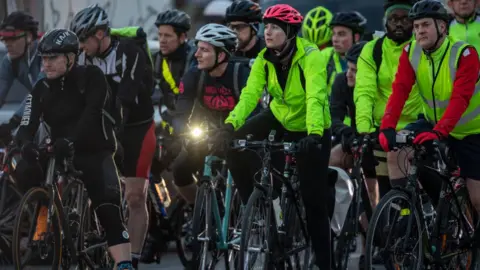 Getty Images
Getty ImagesNearly 4,000 cyclists were killed or seriously injured in the UK in 2017, latest figures from the Royal Society for the Prevention of Accidents (RoSPA) show.
Studies show more than 70% of fatalities had moderate or serious head injuries.
Most serious accidents happen in towns and cities where bike-sharing schemes have helped boost cyclist numbers.
Nextbike has been so successful in Cardiff that it has announced plans to double its network with 500 more bikes and 38 new docking stations.
"It's great that these schemes are getting so many people on bikes, because it cuts down on pollution and traffic. But I'm fed up with seeing people not wearing helmets, especially kids," said Mr Edwards.
"Twenty years ago helmets looked like a bucket with a strap and weren't cool. But now they're far more streamlined, better fitted and nicer designs. And they're not that expensive when it comes to potentially saving your life.
"I wouldn't mind seeing cyclists fined for not wearing them."
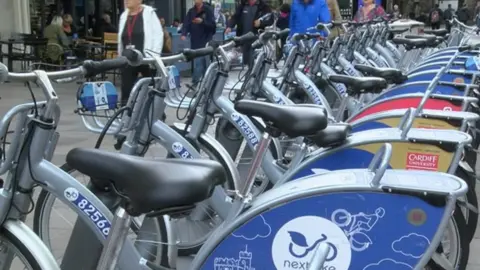
Bike-sharing companies say the logistics of providing helmets would be hugely problematic due to maintenance, loss or theft and the different needs of riders.
At the moment, they are not legally obliged to do so.
The British Medical Association (BMA) also supports making helmets compulsory but reserve the right to review the decision based on the evidence.
While more than 18,000 cyclists were hurt in 2017, Cycling UK insists cycling remains relatively safe.
It said: "The risks of cycling are not exceptionally high and are very small relative to the health benefits. You are in fact as unlikely to be killed in a mile of cycling as in a mile of walking."
For example, of the 5,700 head injury cases among children (under 15) at UK hospitals in 2016, less than 1% were cyclists compared with 5% who were pedestrians.
Cycling charities say more should be done to educate motorists and cyclists, improve and increase cycle lanes and provide safety in numbers for cyclists.
What is the law?
Despite the protection provided, helmet wearing isn't a legal requirement in the UK.
However riders are recommended to wear one by the Highway Code.
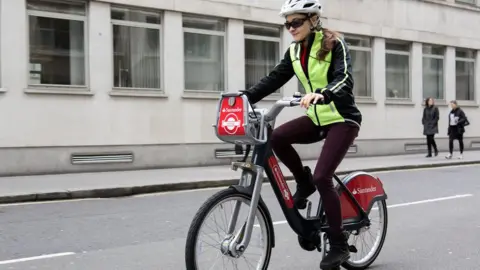 TfL
TfLDo they protect you?
Yes - but they don't make you immune to injury.
The most recent and extensive overview of case-control studies of the protective effect of cycle helmets was in 2016 by the Road Safety Institute in Holland.
In these studies, 64,000 cycling casualties with and without helmets were compared. They estimate that the risk of severe head injury decreases by 69% and the risk of fatal head injury by 65%.
However helmets offer little, if no, protection to the face and jaw and their effectiveness is still being questioned in accidents involving high speeds.
The effectiveness of the helmet also depends on the type of collision and the surface that the helmet makes contact with.
Plus, they do not prevent accidents happening in the first place.
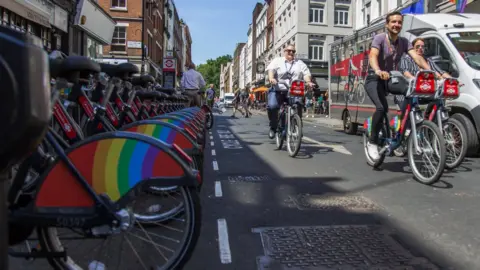 TfL
TfLWhat do bike-sharing companies say?
More than half a million journeys have been taken in Wales on nextbike since the scheme began in May 2018.
More than 57,000 people have registered in Cardiff and Swansea covering 445,000 miles (715,000 km), while nextbike has 237,081 members in 13 cities across the UK in 13 cities, including Glasgow, Belfast and Birmingham.
The company says it takes rider safety "very seriously", strongly encourages the use of helmets and runs classes for new riders.
Managing director Krysia Solheim said: "Currently, UK regulation does not require the use of a helmet while riding a bike and so, instead, we seek to educate users on cycling safety through our website, but leave the decision about whether or not to wear a helmet down to the individual."
Last year Santander Cycles had a record 10.5 million journeys in London.
Santander Cycles urges riders to stay safe by wearing bright clothes during the day and reflective clothing/accessories at night and to "consider" wearing a helmet.
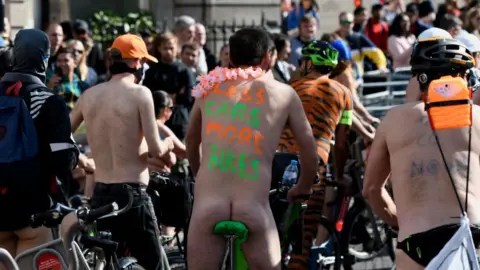 Getty Images
Getty ImagesWhat do charities say?
Charities are united in their opposition to making helmets compulsory due to concerns it will put people off cycling.
They say the health and environmental benefits of physical activity out-weigh the risk of injury from cycling.
Nick Lloyd, RoSPA acting head of road safety, said: "We strongly support cycling and initiatives such a cycle-hire schemes (but) whilst we encourage people to wear a helmet, we would not wish this to be mandated as it might discourage people from cycling.
"A helmet will offer protection from head injury, especially when the speed and forces involved are low. However, it is important to provide segregated cycling facilities where possible to reduce the incidence of vehicle collision from happening."
Cycling UK believes there is "no justification" for making helmet-wearing compulsory and says the effectiveness of helmets "is far from clear".
Sustrans also said evidence is "inconclusive" as to whether helmets make cycling safer.
It added: "What does make cycling safe is changing the layout of roads, streets and public space to make them safer for people to get about by bike.
"Given the concerns about obesity and the deaths related to physical inactivity, making it compulsory for people to wear helmets provides a deterrent to people wanting to cycle and also sends the message that travel by bike is dangerous."
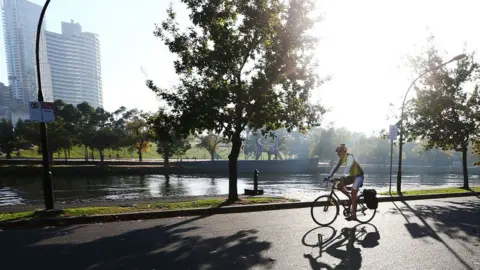 Getty Images
Getty ImagesWhat has happened where it is compulsory?
Australia was the first country in the world to make it compulsory to wear helmets while cycling, in 1990.
Countries such as New Zealand, South Africa and certain states in USA and Canada followed while others, such as France, make it mandatory for children.
However the rule was over-turned in Italy and blocked in Poland.
Campaigners often point to a fall in cycling rates in places such as Australia and Seattle, where it is compulsory, to argue against legislation.
